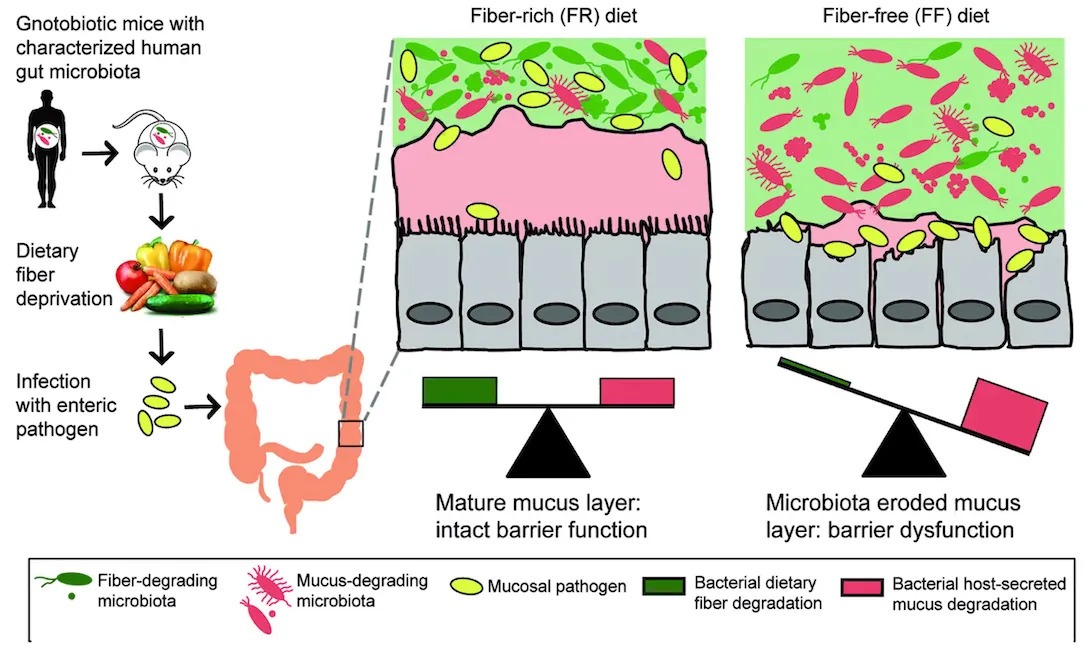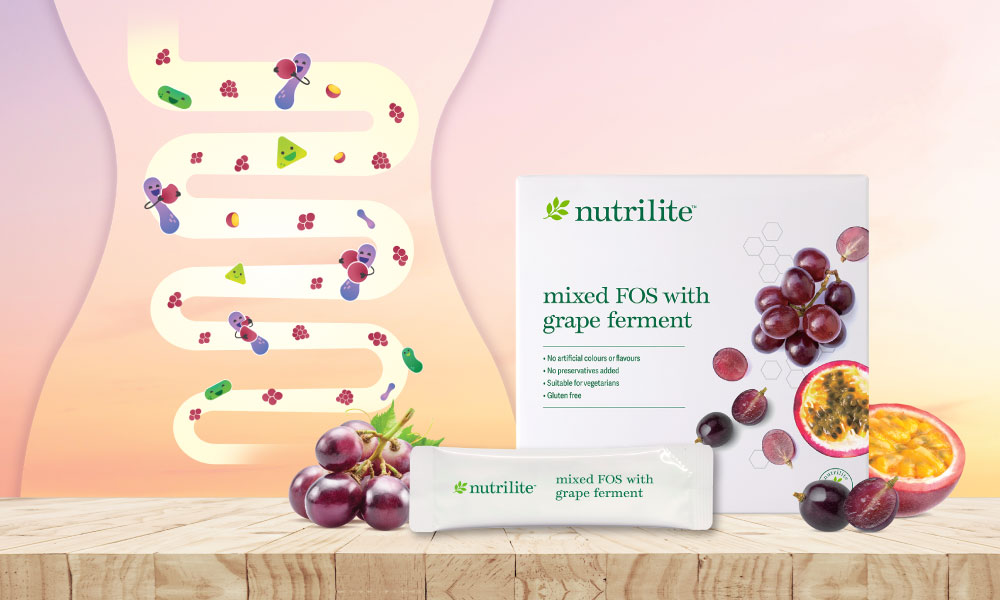Balancing Gut Health: The Role of Your Microbiome and Mucus Layer
Maintaining a Balanced Mucus Layer
The thickness of the mucus layer is crucial; it should neither be too thin nor too thick. A balanced mucus layer indicates a healthy gut environment. When the mucus layer is too thin, it can weaken the gut barrier, increasing the risk of infections and inflammation, as harmful substances can more easily reach the intestinal lining. On the other hand, if the mucus layer is too thick, it can interfere with proper nutrient absorption and digestion, leading to constipation and other digestive issues.
In a fiber-depleted colon, mucus-degrading bacteria, such as AKK, can proliferate excessively. While these bacteria may produce short-chain fatty acids (SCFAs), they do not always produce butyrate, which is essential for the health of goblet cells—specialized cells responsible for mucus production. Without sufficient butyrate, goblet cells struggle to regenerate effectively, leading to a thinner mucus layer. This increased vulnerability raises the likelihood of harmful bacteria coming into contact with the gut lining, escalating the risk of infections and inflammation.
In contrast, a fiber-rich diet promotes a thicker mucus layer, enhancing the gut barrier and overall gut health. Research indicates that butyrate, a short-chain fatty acid produced from fiber fermentation, serves as a primary energy source for goblet cells. Thus, a healthy population of fiber-eating bacteria is essential, as they not only produce SCFAs, including butyrate, but also support the goblet cells by providing the necessary nutrients for effective regeneration. Overall, maintaining a diverse and balanced gut microbiome is key to ensuring the health of goblet cells and the integrity of the mucus layer. (Source)


The Role of Nutrilite Mixed FOS with Grape Ferment in Gut Health
To support this balance, Nutrilite Mixed FOS with Grape Ferment contains a well-rounded blend of prebiotics, including fructooligosaccharides (FOS), indigestible maltodextrin (a type of resistant starch that passes through the digestive system largely undigested), and polyphenols (a category of compounds naturally found in plant foods, such as fruits, vegetables, herbs, spices, tea, dark chocolate, and wine) from grape ferment and passion fruit. Grape ferment, packed with antioxidant properties, not only contributes to gut health but also provides additional protection against oxidative stress, which can damage cells and tissues.
Unlike studies that focus solely on grape ferment—which may lead to a rise in mucus-degrading bacteria like AKK and a thinning mucus layer—Nutrilite Mixed FOS offers a diverse range of prebiotics that nourish both fiber- and mucus-degrading bacteria. This balanced approach not only helps maintain a healthy mucus thickness but also promotes overall gut health through a synergy of botanical ingredients that work together, enhancing each other’s effects. By combining prebiotics with plant-based polyphenols, the product creates a synergistic environment that maximizes nutrient absorption, supports beneficial bacterial growth, and fosters overall gut resilience. Through a balanced blend of prebiotics in this supplement, we can help maintain a harmonious gut microbiome and mucus layer, which is essential for effective weight management.
Understanding the intricate balance of gut health is essential for maintaining a thriving microbiota and a robust gut barrier. By supporting both fiber- and mucus-degrading bacteria through a well-rounded diet and supplementation, we can enhance our gut health and overall well-being. Recognizing the need to address the broader gut-liver-brain axis is key to achieving lasting improvements in health. While fibers in general can promote feelings of fullness, relying solely on fiber intake might only provide a temporary solution for carbohydrate cravings without addressing underlying issues like emotional eating or nutrient imbalances.
Additionally, simply increasing insulin production can be misleading; while it may help regulate blood sugar levels, it can also lead to increased cravings and potentially overwork the pancreas (the organ that produces insulin). A holistic approach is essential for restoring balance to the gut-brain-liver axis (the interconnected system that influences digestion, mood, and overall health) and achieving lasting improvements in health.
GERD and Delayed Gastric Emptying
However, for individuals with GERD (gastroesophageal reflux disease) or delayed gastric emptying, there are special considerations. Feeding AKK with grape ferment polyphenols can promote the production of GLP-1, a hormone that supports appetite suppression and improved glucose control. (Find out more about hormonal balance here.) While this may be beneficial for metabolic health and weight management, the GLP-1-induced slowing of gastric motility and further reduction in stomach acid may exacerbate symptoms for those with GERD, potentially worsening delayed gastric emptying and aggravating their condition. Therefore, personalized approaches are important when addressing the gut-brain-liver axis, particularly for individuals with digestive concerns like GERD.
Conclusion
Achieving optimal gut health is not about focusing on a single element but understanding the interconnectedness of the body’s systems. Supplements like Nutrilite Mixed FOS with Grape Ferment leverage the power of botanical synergy and prebiotic diversity to support both fiber-eating and mucus-producing bacteria, keeping the gut barrier strong and the microbiota balanced.
However, true health extends beyond the gut flora. Supporting the interconnected gut-liver-brain axis, which influences everything from digestion to mental well-being, ensures we nurture our body holistically. A balanced diet, combined with well-rounded supplementation, is the foundation for long-term well-being, helping to manage not only digestive issues but overall metabolic health, emotional resilience, and physical vitality.
Return to:




Achieving optimal gut health involves a delicate interplay among the gut microbiota (the community of microorganisms living in our intestines), the gut barrier, and the mucus layers coating the intestinal lining. Each component plays a vital role in contributing to our overall well-being. Incorporating nutrient-rich foods, like grapes, into our diet can enhance this balance. Grape ferment, in particular, offers unique benefits that support the gut microbiome and promote a healthy mucus layer, as will be discussed in a while.
The Importance of Gut Microbiota
A diverse gut microbiota is crucial for maintaining health, consisting of beneficial bacteria that break down dietary fibers and those thriving on the mucus layers of our intestines. These microbes convert fiber found in fruits and vegetables into valuable metabolite compounds known as "postbiotics," including butyrate, acetate, and other short-chain fatty acids (SCFAs), all of which are exceptionally beneficial for health. These bacteria work together: some produce beneficial SCFAs, others help maintain the mucus layer's thickness, further enhancing its protective function.
For example, Akkermansia muciniphila (often abbreviated as AKK) plays a significant role in gut health and is often referred to as the "Slimming Bacteria" due to its association with improved metabolic health and lower body fat mass. Studies have shown that a higher abundance of AKK is linked to better insulin sensitivity and metabolic outcomes, particularly during dietary interventions aimed at weight loss. (Source)
The Role of Mucus Layers
Mucus layers in the gut serve several essential functions:
Protective Barrier: Mucus acts as a shield against damage from food particles and harmful bacteria, trapping them and preventing them from causing issues.
Moisture Retention: It keeps the gut environment moist, which is important for digestion and nutrient absorption.
Nutrient Absorption: Mucus helps food pass smoothly through the intestines, making digestion and nutrient absorption more efficient.
Microbial Habitat: It provides a safe home for beneficial gut bacteria, allowing them to thrive and contribute to our health.
Immune Function: The mucus layer contains immune cells and antibodies, helping to control immune responses and reduce inflammation in the gut.
Regulation of Gut Movement: Mucus helps ensure that food moves through the digestive tract at the right pace.
pH Regulation: It helps maintain a balanced acidity level in the gut, which is essential for digestion.
Mucosal Healing: If the gut lining gets injured, the mucus layer supports healing by providing a scaffold for new cell growth.


